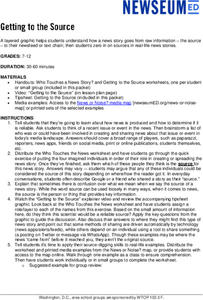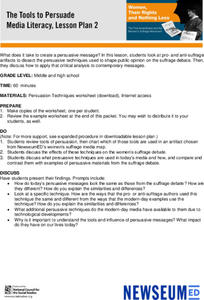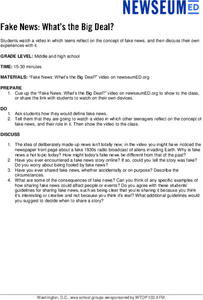Franklin D. Roosevelt Presidential Library & Museum
Pearl Harbor Activity #4: Who is the Audience?
Young historians use the prompts on a worksheet to analyze President Roosevelt's "Day of Infamy" speech. They identify the intended audience for the speech, the devices FDR used to persuade his audience, the responses promoted, and the...
Franklin D. Roosevelt Presidential Library & Museum
Pearl Harbor Activity #2: Why Do Words Matter?
Words matter! That's the big idea behind an activity that asks scholars to replace words in FDR's "Day of Infamy" speech with synonyms. They then listen to a recording of President Roosevelt's address and compare his version to their own.
Newseum
Covering a Catastrophe: Press Conference Simulation
Young journalists have an opportunity to experience the challenges of covering a catastrophe by staging a mock press conference. Half the class acts as reporters while the others act as officials from the mayor's office.
British Council
Drawing Dictation
Scholars give drawing dictations to practice using prepositions of place correctly. They work in groups, taking turn dictating and drawing. Learners then receive a picture they have not seen and write directions to accompany the image.
British Council
Online Safety for Teenagers
Safety in a cyber world is complex but important. Scholars review ways to stay safe online by first writing words given by the teacher. Learners analyze the words to guess the topic of the lesson plan. They then read an online safety...
British Council
The Months of the Year
What month is it? Scholars work with a team and play a game to guess which month is described by given clues. While playing, pupils learn more about what makes each month different with a main focus being on the weather.
British Council
Plastic-Free Is Not Easy
Paper or plastic? Scholars discuss a worksheet containing grocery photos in which consumers were challenged to buy items without plastic wrapping or containers. Learners rank the food items by the need for packaging, such as a banana,...
British Council
21st Century Jobs
Let's get to work! Using the resource, pupils discover some of the environmental impacts of the workplace, completing a worksheet on 21st-century jobs. Next, they work in small groups to collaboratively write four ideas about the future...
British Council
Farming and the Environment
What is the connection between farming and the environment? Scholars complete a worksheet to learn about the environmental impacts of farming. Next, individuals assume the identity of someone within a farming community and role play...
British Council
Chocolate
Are you the biggest chocoholic? Scholars read text about people eating chocolate and sequence the text by putting them in order of who ate the most to least chocolate. They quiz classmates to discover who is the biggest chocoholic in the...
Newseum
'The Press and the Civil Rights Movement' Video Lesson
Scholars watch a video featuring journalists who covered the civil rights movement, then respond to questions on a viewing guide. The video features interviews with participants and original news footage from the 1950s and 1960s. In...
Newseum
Photo Ethics: What Is Newsworthy?
Do not try this at home! At school! Or any other place! Groups of young journalists discuss the ethics of publishing photos of school peers performing dangerous stunts. They share their decision with the class and explain their reasoning.
Newseum
The Making of Fake News: A Case Study
"Fake News" (stories that are entirely fabricated/fictional) is the subject of a case study of the search for Jestin Coler, the creator of some of the most famous fake news stories. After reading NPR's investigative report, scholars...
Newseum
Civil Rights: Your Stories of Change
Young activists examine local civil rights issues presented in news media sites to determine what elements make these stories attention-grabbing and trustworthy. Using this information and their worksheets from the first two lessons in...
Newseum
Civil Rights: The Five Freedoms
After a close reading of the First Amendment and the five freedoms it guarantees, class members examine the civil rights timeline to see how civil rights groups applied these freedoms to create change. Using the issue the class chose in...
British Council
Upcycling
It's time for a new life! Scholars learn what it means to give products new life by upcycling. They complete a crossword puzzle, read and discuss an article, and play a game about upcycling ideas.
British Council
Sports in (Climate) Crisis
Can sports affect the climate? Scholars read an article about the effects sports have on the enivronment. They then complete a problem tree sheet to brainstorm solutions for the issue.
Newseum
Photo Ethics: Diversity
With the advent of photo manipulation software, it is possible to digitally edit a photograph in a way that is virtually undetectable. The question asked of young journalists in this lesson is whether such manipulation is ethical. Groups...
Newseum
Getting to the Source
Reliable news stories are based on facts from reliable sources. Young journalists learn how to evaluate the reliability of news sources by watching a short explainer video. Teams apply their new source-digging skills to a current news...
Newseum
The Tools to Persuade
After reviewing persuasion techniques, young historians examine how a specific technique was used in the pro- or anti-suffrage messages. They then examine how that same technique is used in modern-day media messages.
Newseum
Fake News — What's the Big Deal?
In a time of fake news and alternative facts, young people must have the ability to identify it and its role. Scholars watch a video of teens reflecting on the concept of fake news and the impact of sharing fake news stories. They then...
California Department of Education
In the Interview Hot Seat
After watching a short introductory video, high school seniors prepare for the interview process by first examining commonly used questions and effective responses. Class members then engage in a series of Speed Interviews to gain...
California Department of Education
Learn to Reach Out
High school seniors use the CareerOneStop website to research professional associations related to careers that interest them. They then develop interview questions and arrange an informational interview with someone in the field.
California Department of Education
Etiquette? What’s That?
After watching a video, reading articles about etiquette in the workplace, and engaging in discussions, high school seniors create a presentation to show what they have learned about business etiquette.

























